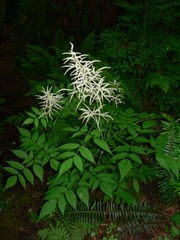Aruncus
| Aruncus subsp. var. | ||||||||||||||||||||||||||||||||||||||||||||||||||||||||
|---|---|---|---|---|---|---|---|---|---|---|---|---|---|---|---|---|---|---|---|---|---|---|---|---|---|---|---|---|---|---|---|---|---|---|---|---|---|---|---|---|---|---|---|---|---|---|---|---|---|---|---|---|---|---|---|---|

|
|
| ||||||||||||||||||||||||||||||||||||||||||||||||||||||
| ||||||||||||||||||||||||||||||||||||||||||||||||||||||||
| Standard Cyclopedia of Horticulture |
|---|
|
Aruncus (old name). Rosaceae. Goat's-beard. Ornamental tall perennial herbs, cultivated chiefly for the large showy panicles of white flowers and also for the handsome much-divided foliage. Leaves bi- to tripinnate with minute or wanting stipules: fis. dioecious, small; calyx 5-lobed petals 5; stamens many; pistils commonly 3: the follicles dehiscent, glabrous, usually 2-seeded; seeds minute, dull.— Two species in N. Amer., N. and W. Eu., N. Asia to Japan. Formerly usually referred to Spiraea, which differs chiefly in its shrubby habit, simple, rather small Lvs., and 5 pistils. They are tall perennial herbs with large compound leaves and small white flowers in slender spikes forming large terminal panicles. The species in cultivation is hardy North; it prefers rich rather moist soil and grows well in half-shady situations. Propagation is by seeds, which germinate readily, and also by division of older plants.
|
Aruncus {{{latin_name}}}
|
'
| ||||||||||||||||||||||||||||||||||||||||
|---|---|---|---|---|---|---|---|---|---|---|---|---|---|---|---|---|---|---|---|---|---|---|---|---|---|---|---|---|---|---|---|---|---|---|---|---|---|---|---|---|---|

|
|
| |||||||||||||||||||||||||||||||||||||||
| |||||||||||||||||||||||||||||||||||||||||
- Do you have a description of this genus or plant? Edit this section!
Cultivation
| calendar? | ||
|---|---|---|
| January: | ||
| February: | ||
| March: | ||
| April: | ||
| May: | ||
| June: | ||
| July: | ||
| August: | ||
| September: | ||
| October: | ||
| November: | ||
| December: | ||
| Notes: | ||
- Do you have cultivation info on this plant? Edit this section!
Propagation
- Do you have propagation info on this plant? Edit this section!
Pests and diseases
- Do you have pest and disease info on this plant? Edit this section!
Species
Gallery
If you have a photo of this plant, please upload it! Plus, there may be other photos available for you to add.
-
photo 1
-
photo 2
-
photo 3
References
External links
- w:Aruncus. Some of the material on this page may be from Wikipedia, under the Creative Commons license.
- Aruncus QR Code (Size 50, 100, 200, 500)
